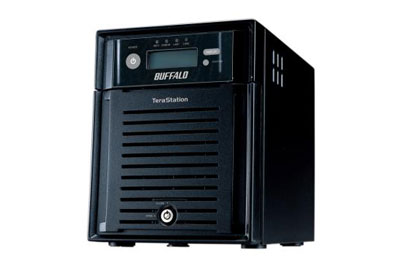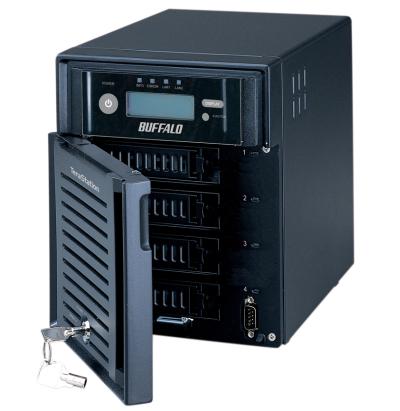Buffalo TeraStation III 2TB review
We've had mixed responses to Buffalo's previous NAS efforts. Can its updated TeraStation impress us?

We weren't expecting much from Buffalo's TeraStation III due to its staid appearance, but were pleasantly surprised by its appealing and well-designed web management interface and generally fast performance. Its slow speeds copying small files is disappointing and the lockable front door could be strengthened, but if you can live with these flaws then the TeraStation is a great NAS.
There are four drive bays located behind a lockable door, although it will deter only casual thieves as we were able to prise it open with minimal force even without a key. Four 500GB hard disks are fitted and can be configured as RAID 0, 5 and 10. You can also create two separate RAID 1 arrays if you wish. The disks are mounted in trays and can be easily unscrewed and replaced in the event of a disk failure. The front mounted LCD screen enables you to keep track of useful information such as the current RAID status and IP address.
We were impressed with the TeraStation's performance copying large and medium sized files, although it was very slow transferring tiny files. If you need data redundancy it can be difficult choosing between RAID 5 and 10. RAID 5 gives 1.5TB storage instead of just 1TB as with RAID 10, but the TeraStation is slower at copying both medium and small files when configured as RAID 5 then when it's configured as either RAID 0 or 10.

When configured as RAID 0, large files were copied at an average speed of 32.34MB/s, while medium sized files were transferred at 22.19MB/s and small file files crawled along at 1.22MB/s. When configured as RAID 10, it was only fractionally slower at copying medium and small files but was around 3MB/s slower then copying large files. When configured as RAID 5, its large files performance was only marginally slower than what it was under RAID 0 or 10 but it was 9MB/s slower at copying medium sized files and only managed to copy small files at a mere 1MB/s.
Extra storage can be added by plugging USB hard disks into the two rear USB ports. The TeraStation can also be used to share a USB printer across a network, potentially saving the cost of a dedicated network printer. The rear serial port is used for connecting a UPS so the TeraStation can be set to shut down safely in the event a power failure. The TeraStation can be configured to wake up and go back to sleep again either every day or only on specific days. Up to three different schedules can be set. It's not quite as sophisticated as Netgear's ReadyNAS Duo which can have different settings for every day of the week, but it's still a useful power saving feature to have.
Get the ITPro daily newsletter
Sign up today and you will receive a free copy of our Future Focus 2025 report - the leading guidance on AI, cybersecurity and other IT challenges as per 700+ senior executives
-
 Layoffs loom for underskilled tech workers and poor performers – but there's light on the horizon for those willing to upskill
Layoffs loom for underskilled tech workers and poor performers – but there's light on the horizon for those willing to upskillNews Tech hiring managers expect to make layoffs in the coming months, with roles ripe for automation and workers with outdated skills the most likely to be cut.
By Emma Woollacott Published
-
 Executives think AI can supercharge cybersecurity teams – analysts aren’t convinced
Executives think AI can supercharge cybersecurity teams – analysts aren’t convincedNews As organizations adopt AI, frontline cybersecurity workers are worried AI will reduce job security and increase their manual workload
By Rory Bathgate Published
-
 Software deployments are plagued by delays: Rampant skills shortages and underinvestment are slowing down processes – and it’s costing businesses big
Software deployments are plagued by delays: Rampant skills shortages and underinvestment are slowing down processes – and it’s costing businesses bigNews UK software deployments are running an average of four months beyond schedule, new research shows, with delays affecting more than eight-in-ten businesses.
By Emma Woollacott Published